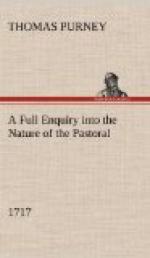And as for Pity, the most delightful Passion of all, it can’t be excited by this Means. For those Swains are inured to Labour, and acquainted with Fatigue; but we pity those who fall from Greatness to a State of Hardships.
CHAP. III.
What Personages are most proper for Pastoral. And what Passions we may allot our Shepherds; and what degree of Knowledge.
Since Simplicity and Tenderness are universally allow’d to constitute the very Soul and Essence of Pastoral, there la nothing scarce in the Proceedings of Pastoral-Writers more surprizing to me, than that no one has allotted any Part of Characters in their Pieces to the SOFT-SEX: But have, to a Writer, introduc’d only Men, and even the roughest of that Sex.
I can no otherways account for that their Conduct, but that Theocritus happen’d not to make any true Female Characters, nor to introduce any such of the Fair-Sex, as would shine in Pastoral, and they pretend to nothing farther than the Copying after him.
This is the more strange, since even Epick-Poetry and Tragedy, whose Nature is Violence and Warmth, cannot well subsist without the tender Characters. ‘Tis they that sprinkle so sweet a Variety thro’ those Pieces, and relax the Minds of the Readers, with the Beautiful and Soft, after it is sated with the Sublime.
Now if even the warmest Kinds of Poetry delight in Female Personages, How much more Pastoral, which is all Tenderness and Simplicity? Whose design is to sooth and spread a Calm over the Mind, as the higher Poems are to elevate and strike It.
But ’tis not enough that we introduce some Characters drawn from the SOFT-SEX: our Male Characters must be also of the same Nature, far from rough or unmanner’d. Every Character must also be of such a Kind as will be entertaining to the Mind. For there are some more, some less delightful, among those Female Characters, which at first sight seem equally proper to Pastoral. Of this kind is a Prudish Character, or excessively reserv’d. For, besides that frankness and Openness of Heart, is what we imagine natural to Shepherds, a Poet can never raise Delight from such a Character. Her fault is too hateful to excite Pity in her Punishment; and too small to raise Joy in beholding bar Unfortunate. Besides that such a Joy were not proper for Pastoral. Of the same Nature is a Finical, or Squeamish Character, and many others, at first sight agreeable to Pastoral.
SECT. 2
What Passions we may allot our Shepherds.
Although I am for raising the Characters in Pastoral somewhat above the degree of Boors and Clowns; yet no one is more for retaining the Pastoral Simplicity. Our Characters of young and tender Innocents, give, I think, a better Opportunity of introducing the true Pastoral Simplicity, than those very mean and low Personages, which rather lead us to an unmanner’d Clownishness, than an agreeable Simplicity.




